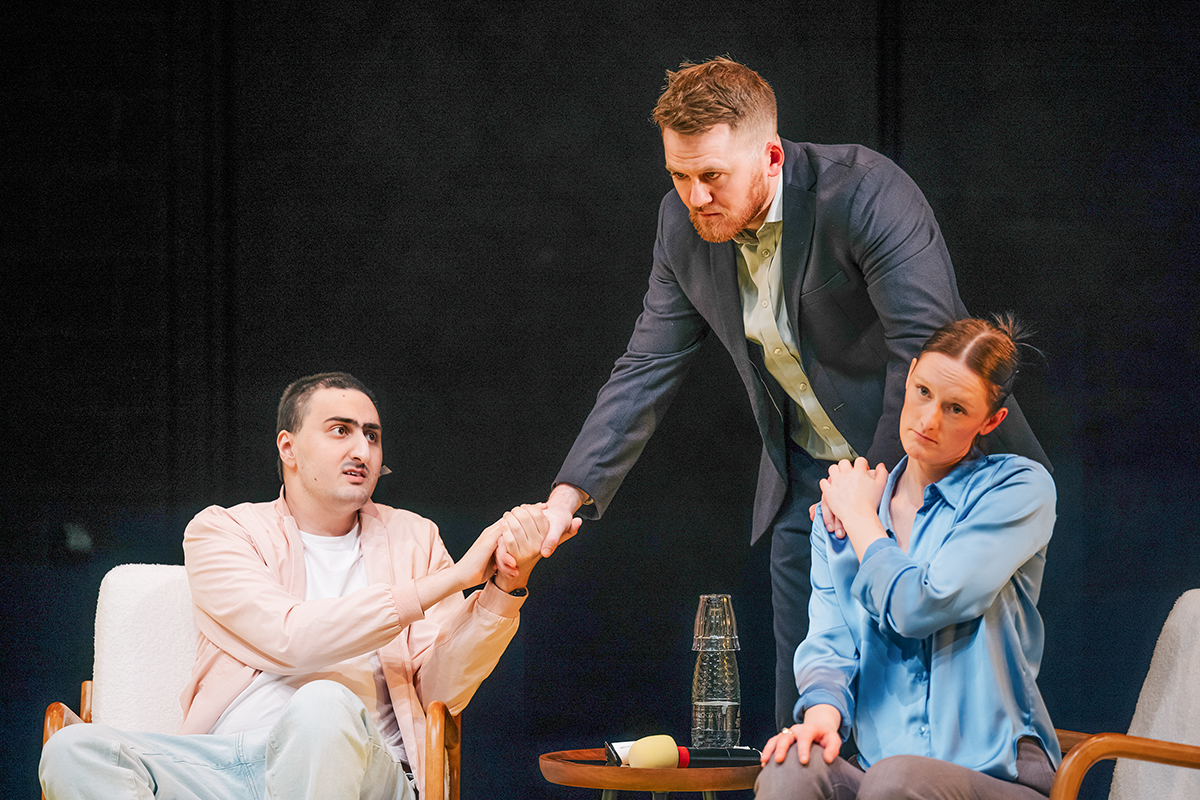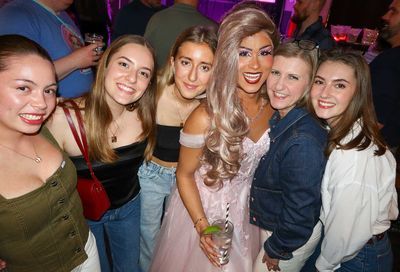‘The Jungle’ Review: Total Immersion
A brilliant concept impeccably executed, 'The Jungle' immerses audiences in the stirring drama of a migrant camp under threat.

Welcome to “Dzjangal,” the makeshift migrant village brought vividly, viscerally to life in The Jungle (★★★★★), a singular theatrical experience co-presented by two local theater powerhouses, Woolly Mammoth and the Shakespeare Theatre Company, inside STC’s Sidney Harman Hall.
The Harman Hall stage has been obscured by the camp cafe, filled with rows of picnic tables and benches arranged on a dirt floor with raised platforms running between them. Audience members enter through the crudely fashioned, but seemingly complete, kitchen into the vast cafe, which is sectioned off by nation — much like the camp outside the cafe’s wood-plank walls, we’re later told.
While performers wearing kufis and keffiyehs circulate around the cafe, patrons are seated by country — Afghanistan, Somalia, Iran, Egypt, Eritrea, Kurdistan, Pakistan, Yemen, Syria, and Sudan, among others. TVs mounted in the corners play Bollywood musicals, as Salar (Ben Turner), the Afghani who runs the cafe, cooks in the kitchen.
Hot off of sold-out runs in London and New York, The Jungle, written by Joe Murphy and Joe Robertson, and directed by Stephen Daldry and Justin Martin, aims to transport audiences to a real-life time and place — the Calais Jungle migrant camp, circa 2015 — and the illusion is indeed enthralling.
Besides the flawless performances, and layered sound design by Paul Arditti, set designer Miriam Buether and her team have created an environment that powerfully evokes the warmth, ingenuity, and fragility of this vital gathering place within the Jungle’s growing mini-city of migrants and refugees.
Located on a former landfill site east of Calais, at the French end of the Channel Tunnel, the Jungle is a sprawling way station, teeming with thousands from the aforementioned nations and elsewhere, awaiting their shot to stowaway in a lorry, car, or train passing through the chunnel to the U.K.
Some choose to seek asylum in France, but still must wait their turn in the Jungle, where tonight, camp leaders and representatives of the camp’s various nations have assembled for an emergency meeting to discuss how to confront the impending threat of eviction. The French police might at any moment come battering through the doors, clearing their way with teargas. They’ve done it before.
Safi (Ammar Haj Ahmad), a former English Lit major from Aleppo, and Mohammed (Jonathan Nyati), the fair-minded representative of the Sudanese coalition, are the leading voices for the migrants at the meeting, working to organize everyone into action. The discussion is tense, occasionally heated, even before the debate is cruelly interrupted by news that a beloved figure in the camp was killed on the highway leading to the tunnel.
From that gut-punch moment, the story turns back several months to trace how these many disparate lives from so many places became a community, and how this scrap of landfill became a home, with a cafe, a library and school, and places of worship. Seated at a table with a nation — we sat with Afghanistan — the audience is there to witness, but might also, through such extraordinary immersion, feel a deeper kinship with the desperate and displaced who call the Jungle home.

Or, one might just relate to the well-meaning white activists and NGO reps who turn up, and assume that the camp’s name, Dzjangal, the Pashto word for woods or forest, is merely the migrants’ mispronunciation of the English word, jungle. Some of those activists, like Paula (Julie Hesmondhalgh), genuinely exhibit care and offer constructive assistance. Others, like young, inexperienced Sam (Jonathan Case), accused of colluding with French government representative Henri (Max Geller) and the French police, might do more harm than good.
Will there be anyone in the audience rooting for the police to storm in and bomb the place with teargas? These days, that’s possible. Although it would take a truly hard heart to resist The Jungle‘s passionately empathetic view of fellow humans, who, for whatever reasons, must cease existing as a person to survive as a refugee.
The Jungle runs through April 16 at Sidney Harman Hall, 610 F St. NW. Tickets are $75 to $155, and are almost entirely sold out. Call 202-547-1122, or visit www.shakespearetheatre.org.
Support Metro Weekly’s Journalism
These are challenging times for news organizations. And yet it’s crucial we stay active and provide vital resources and information to both our local readers and the world. So won’t you please take a moment and consider supporting Metro Weekly with a membership? For as little as $5 a month, you can help ensure Metro Weekly magazine and MetroWeekly.com remain free, viable resources as we provide the best, most diverse, culturally-resonant LGBTQ coverage in both the D.C. region and around the world. Memberships come with exclusive perks and discounts, your own personal digital delivery of each week’s magazine (and an archive), access to our Member's Lounge when it launches this fall, and exclusive members-only items like Metro Weekly Membership Mugs and Tote Bags! Check out all our membership levels here and please join us today!


























You must be logged in to post a comment.